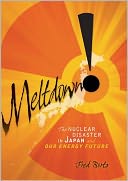Since completing my recent middle grade book,  Meltdown! The Nuclear Disaster in Japan and Our Energy Future, which is about the implications for our energy future of the Fukushima Daiichi meltdowns that followed the massive earthquake and tsunami of March 11, 2011, I have been following developments in Japan’s nuclear industry closely.
Meltdown! The Nuclear Disaster in Japan and Our Energy Future, which is about the implications for our energy future of the Fukushima Daiichi meltdowns that followed the massive earthquake and tsunami of March 11, 2011, I have been following developments in Japan’s nuclear industry closely.
In July of this year, a panel of experts reported to the Japanese Diet (Parliament) that the major cause of the accident was insufficient government regulation. The report concluded that the Fukushima accident could have been prevented if the government and industry had paid attention to known risks and acted accordingly.
Yesterday, the Tokyo Electric Power Company (TEPCO) finally acknowledged that it knew the older reactors at Fukushima Daiichi needed to be replaced or upgraded for safety. But they claim that they didn’t act because of political, legal, and economic concerns.
Is TEPCO’s acknowledgement and explanation merely an excuse, or is it a valid reason? What should we as citizens do to make sure existing and future nuclear power plants are safe? And what does this story tell us about the role of nuclear power in our energy future?
The answers to those questions are not obvious, but they suggest that we need to consider changes in government nuclear energy policies around the world. Readers of this blog include educators–mainly teachers and librarians–who serve the intended audience of this book. If you are such an educator, or if you know one, please consider using Meltdown! and those questions as a jumping off point for a project to promote critical thinking skills and analytical ability in Middle Graders and Young Adults.
If you plan to develop such a lesson, please contact me through the e-mail link at my website. I will suggest a number of useful supporting materials, including the publisher’s online eSource materials and the Meltdown! Links and Updates web page.